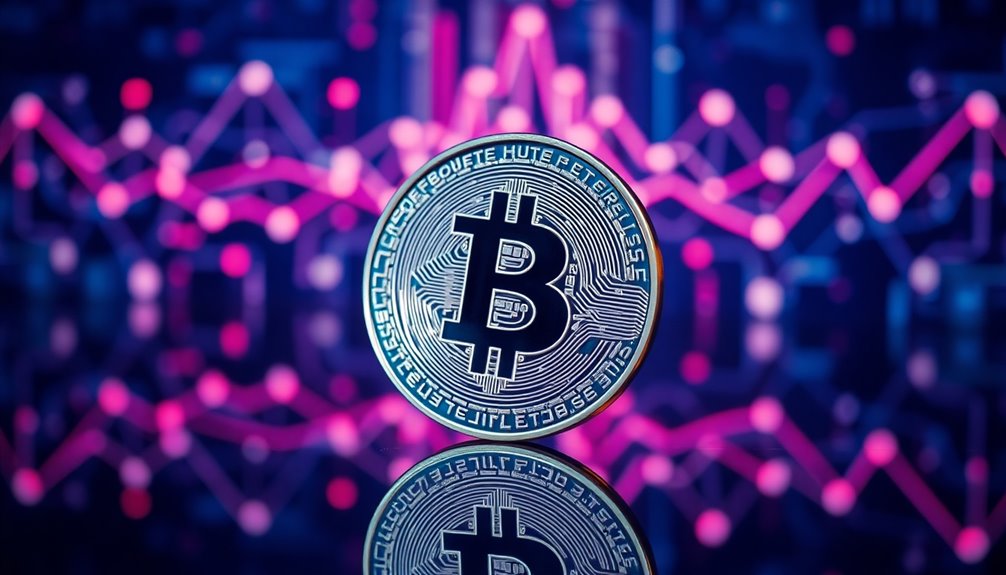Security tokens are digital assets that represent ownership rights, operating within the framework of securities laws. They provide you access to regulated capital raising through Security Token Offerings (STOs). You can invest in various forms, like equity or asset-backed tokens, often enabling fractional ownership of high-value assets. This boosts liquidity in traditionally illiquid markets and enhances investment opportunities. However, navigating regulatory compliance can be tricky due to varying rules. With the growing demand for digital assets, understanding security tokens could open new paths for your investment strategy. Curious about the implications and benefits? There's more to explore!
Key Takeaways
- Security tokens represent ownership rights of assets and are regulated under securities laws.
- They can take various forms, including equity, debt, and asset-backed tokens.
- Tokenization allows for fractional ownership, making high-value assets more accessible to investors.
- Security tokens enhance liquidity in traditionally illiquid markets and streamline fundraising through Security Token Offerings (STOs).
- Regulatory compliance is crucial for maintaining market integrity and protecting investors.
Key Features of Security Tokens

Security tokens offer distinct advantages that set them apart in the digital asset landscape. They represent ownership rights and are governed by securities laws, unlike utility tokens.
Through Security Token Offerings (STOs), you can access a regulated method of raising capital, ensuring compliance with legal frameworks. These tokens come in various forms, including equity tokens, debt tokens, and asset-backed tokens, enhancing your investment opportunities.
One standout feature is fractional ownership, which lets you buy smaller shares of high-value assets, improving liquidity in traditionally illiquid markets.
Security Token Market Overview

In 2023, the security token market is estimated to be worth USD 3.2 billion, showcasing a remarkable surge in interest and investment in tokenized assets. This growth reflects the increasing demand for digital assets, enhanced by blockchain technology that enables fractional ownership.
You can access a global pool of investors, making traditionally illiquid assets like real estate and fine art more liquid. Security token offerings (STOs) streamline fundraising processes, cutting transaction costs and settlement times significantly compared to traditional securities.
However, it's crucial to understand that compliance with securities laws is essential. Tokens must meet legal standards for investment products, ensuring that popular use cases, such as equity and debt tokens, are securely managed within the market.
Tokenization of Real Assets

The rising interest in security tokens paves the way for an exciting development: the tokenization of real assets. By converting physical assets like real estate or artwork into digital tokens, you gain a new level of ownership and liquidity.
This process allows for fractional ownership, letting you invest in high-value assets without breaking the bank. A blockchain network ensures transparent and secure authentication of ownership, reducing disputes and building trust.
Additionally, smart contracts automate compliance and payment processes, cutting costs tied to intermediaries. This innovation expands investment opportunities, enabling you to trade assets globally, free from traditional market hours or geographic limitations.
With tokenization, the future of investing in real assets looks brighter than ever.
Pros and Cons Overview

Navigating the world of security tokens involves weighing both benefits and drawbacks.
On the upside, security tokens enhance liquidity by tokenizing traditionally illiquid assets, allowing fractional ownership and access to a global pool of investors via blockchain technology. They also reduce transaction costs and improve transparency, streamlining compliance processes with immutable records.
However, you must consider the cons as well. Regulatory uncertainty can hinder the acceptance of security tokens, posing risks to both issuers and investors. Additionally, market volatility may lead to significant value fluctuations, impacting your investments.
Finally, potential security vulnerabilities in smart contracts and the risk of fraud in unregulated offerings present critical challenges that could undermine the integrity of the security token ecosystem.
Security Tokens Versus Traditional Assets

While both security tokens and traditional assets represent ownership interests, they diverge significantly in structure and functionality.
Security tokens are digital assets created and traded on blockchain technology, using smart contracts to automate compliance and streamline transactions. This reduces costs and speeds up settlement times compared to traditional assets that often rely on intermediaries.
One major advantage of security tokens is fractional ownership, allowing you to invest in high-value assets in smaller portions, which isn't typically feasible with traditional structures.
Additionally, the tamper-proof nature of blockchain tech ensures a transparent record of ownership and transactions, minimizing disputes.
Security tokens also enhance liquidity for traditionally illiquid assets by enabling 24/7 trading across various platforms, unlike traditional assets restricted to market hours.
Regulatory Compliance Hurdles

Security tokens offer numerous benefits over traditional assets, but they also face significant regulatory compliance hurdles that can complicate their adoption.
In the U.S., you must navigate the Securities and Exchange Commission's (SEC) requirements, which dictate that security tokens either register or qualify for an exemption to avoid penalties. The varying rules across jurisdictions create regulatory uncertainty, affecting market access.
When issuing security tokens via Security Token Offerings (STOs), you need to meet strict disclosure requirements to protect investors. Additionally, compliance with Anti-Money Laundering (AML) and Know Your Customer (KYC) regulations is crucial, as platforms must verify investor identities to prevent illicit activities.
These hurdles can deter both issuers and investors from fully embracing security tokens.
Decentralized Finance Integration

As the world of finance evolves, integrating security tokens into decentralized finance (DeFi) platforms is proving to be a game changer. By enabling the trading of tokenized assets, these platforms enhance liquidity and accessibility for you as an investor.
With blockchain technology, security tokens provide transparency and traceability, improving investor confidence while reducing fraud risks. The use of smart contracts ensures automated compliance with regulatory requirements, streamlining the processes of issuance and trading without intermediaries.
Additionally, security tokens facilitate fractional ownership, allowing you to buy and sell portions of high-value assets, democratizing investment opportunities. This integration also paves the way for innovative financial products, such as tokenized derivatives and automated liquidity pools, expanding your investment strategies.
Secure Private Keys Diligently

Effective management of private keys is critical for safeguarding your security tokens. These private keys, which serve as your authentication information, need to be protected using robust cryptographic algorithms. Losing or compromising them can lead to irreversible loss of access to your digital security tokens.
To enhance security, consider using hardware security modules (HSMs) and secure enclaves to guard against unauthorized access and hacking attempts. Implementing multi-signature wallets can also provide an extra layer of protection, requiring multiple private keys to authorize transactions, thus reducing risks from single key compromise.
Regular audits and updates to your key management practices are essential to stay ahead of evolving cybersecurity threats and ensure the integrity of your security token systems.
Frequently Asked Questions
What Is an Example of a Security Token?
An example of a security token is bNVDA, which represents fractional ownership in Nvidia stock.
When you trade it on the INX exchange, you're essentially buying a piece of the company.
There are also equity tokens linked to startups that give you rights to dividends, debt tokens representing loans that earn interest, and asset-backed tokens tied to real estate, allowing you to share in the income or property value appreciation.
What Is Your Security Token?
Your security token represents your ownership or rights to an asset, often managed on a blockchain.
It's designed to comply with securities regulations, providing you with potential benefits like dividends or voting rights.
When you participate in a Security Token Offering (STO), you're investing in a regulated environment that allows for fractional ownership and increased liquidity.
This can open new investment opportunities and make previously inaccessible markets available to you.
What Does It Mean if a Token Is a Security?
If a token's classified as a security, it means you're dealing with an investment that involves money in a common enterprise, expecting profits from the efforts of others.
This classification subjects it to strict regulations and compliance with securities laws, ensuring transparency and investor protection.
Unlike utility tokens, security tokens can offer you rights like dividends or profit sharing, making them a more structured investment option.
What Are Security Access Tokens?
Security access tokens are digital tools you use to verify your identity during online transactions. They come in various forms, like hardware devices, mobile apps, or SMS codes.
Conclusion
In conclusion, security tokens are revolutionizing the way we view and trade assets. With their key features like regulatory compliance and integration into decentralized finance, they offer exciting opportunities for investors. However, it's essential to weigh the pros and cons and navigate the regulatory landscape carefully. As you explore this evolving space, remember the importance of secure private keys to protect your investments. Embrace the future of finance by staying informed and proactive in your investment strategies.









